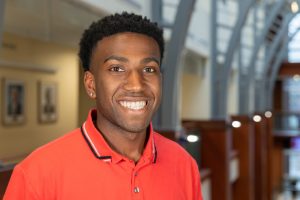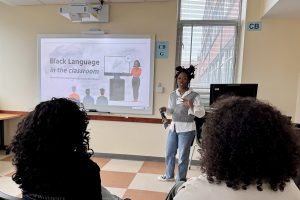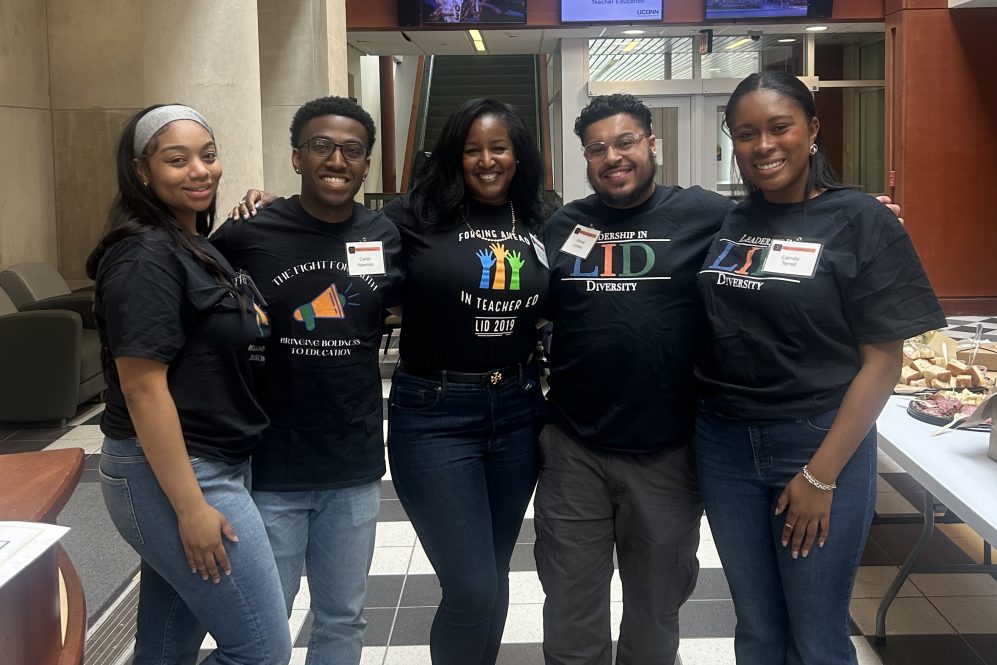On April 5, the Leadership in Diversity (LID) student organization held its annual multicultural education conference at UConn Storrs, offering space for dialogue and discussion among educators across Connecticut. The event, titled “Empowering Education: Strength in Opportunity and Equity,” was free and coordinated by students in the Neag School of Education’s Integrated Bachelor’s/Master’s teacher preparation program who lead LID.
Founded in 2014 by two Neag School students, LID aims to equip aspiring educators with the necessary tools, networks, and knowledge to become competitive, well-rounded, and culturally responsive professionals.

“Our annual spring conference is a staple to our community,” said Carter Newman ’24 (ED), ’25 MA, vice president and treasurer of LID. “We have the privilege of hosting this event for students, faculty, and the greater education community to spread the joy of working in this field. Each conference features a diverse set of presenters who share their impact in the educational field and creates space for guests to engage with one another, sharing their own expertise.”
Daniel Lozano ’24 (ED), ’25 MA, secretary of LID, emphasized the organization’s importance in promoting inclusion.
“Understanding and supporting Leadership in Diversity is vital because it fosters inclusive leadership and challenges us to confront systemic inequities in our schools and communities,” Lozano said. “We are deeply grateful to the educators who continue to support our organization’s mission and who work every day to create more just and inclusive learning environments.”
Held in the Charles B. Gentry Building, the conference featured eight rotating presentations, including:
- Perspectives About Translanguaging Amongst Dual Language Educators, presented by Natalia Murphy ’25 (ED), ’26 MA
- The Power of Mentorship in Education, presented by Terrell Huff, CEO of Dilligence Training Cares
- Navigating Conflict: The Intersection of Cultural Competency and Effective Resolution, presented by Tonya Clairborne and Scott Hurwitz ’06 (ED), ’07 MA, ’19 Ed.D., ’21 ELP, Glastonbury Public Schools
- Affinity Group in the Meriden Public Schools: Recruiting and Retaining Racially Diverse Educators, presented by Orlando Valentin Jr. ’13 (ED), ’15 MA, ’19 6th Year, Meriden Public Schools
- Incorporating Social Justice into Curriculum, presented by Toby Way, Mansfield Public Schools
- AAVE? Ebonics? Slang? Can We Call This a Language?, presented by Mikaya Robinson ’24 (ED), ’25 MA
- Building Effective Relationships with Students with Challenging Behaviors, presented by Vilenti Tulloch, CEO of Academic Leadership Association
- Disability Inclusivity in Elementary Education, presented by Lauren Midgette, Neag School adjunct professor
“The passion that comes from our presenters, attendees, and the team behind planning is something I love being able to witness,” said Camille Terrell ’24 (ED), ’25 MA, LID co-president. “The work and discussion that is done at this conference is meant to inspire, change, and equip current and future educators to provide students with the opportunity to forever learn and grow.”
The work and discussion that is done at this conference is meant to inspire, change, and equip current and future educators to provide students with the opportunity to forever learn and grow. — Camille Terrell ’24 (ED), ’25 MA, LID co-president
Logan McCallum Laval ’24 (ED), ’25 MA, co-president of LID, noted the event’s strong attendance despite a new format.
“We were especially pleased to see such a strong turnout,” Laval said. “We are thankful for those who attended, presented, came to learn, and be a part of such impactful conversations around education.”
Murphy presented a case study conducted at an elementary school in eastern Connecticut, exploring how dual language teachers work to bridge the gap between students’ natural language practices and the long-standing language separation policies of districts.
“It’s not just the English speakers or the non-English speakers, everyone is valued in this process,” Murphy said. “Every student’s language skills and the things they bring to the table are important to us.”
Hurwitz and Clairborne focused on how cultural competency strengthens conflict resolution by helping educators recognize and respond to different communication styles and ways of handling conflict.
“Sometimes, as a leader, listening is your most important skill that you can exhibit,” Hurwitz said. “You think as a leader that you have to talk, but sometimes not talking is the best way to begin solving the problem.”
Midgette highlighted the need for disability representation and inclusivity in education, as well as shared practical strategies to achieve it. She was joined by her 6-year-old daughter, helping illustrate how meaningful and respectful conversations about disability can be integrated into early learning environments.
“I am a secondary educator by training, but after having this beautiful little girl in 2019, I became more interested in elementary education and the ways that we are ensuring that our youngest get the same conversations but at an appropriate level,” Midgette said.

Robinson discussed the work of April Baker-Bell, an academic scholar, in her research of Black Language. The presentation focused on how educators can champion linguistic justice in their classrooms through language, writing, and reading.
“Recognizing and embracing Black Language in educational spaces only strengthens our goals as educators to create an inclusive learning environment for every student,” Robinson said. “Change begins with knowledge — and with that, we can create safer spaces for Black students and speakers of Black Language.”
Alyssa Hadley Dunn, director of teacher education at the Neag School, praised the event and its organizers.
“I was so impressed and inspired by the LID conference, including the outstanding organizers and the individual presenters,” Dunn said. “Our Neag School students and alumni who presented their research were passionate about educational justice and did a wonderful job engaging the audience. They are wonderful examples of the type of educators we need in today’s world.”
Dominique Battle-Lawson, LID advisor and assistant director of student support at the Neag School, underscored the importance of fostering inclusive education and professional networks.
“LID is one of several initiatives to bridge this gap by supporting and encouraging prospective Neag School students of color throughout the UConn application process,” Battle-Lawson said. “We also strive to assist current Neag School students of color by offering networking opportunities, professional development, and a safe space to discuss educational issues. This work is essential for ensuring a more inclusive and representative future in education.”



